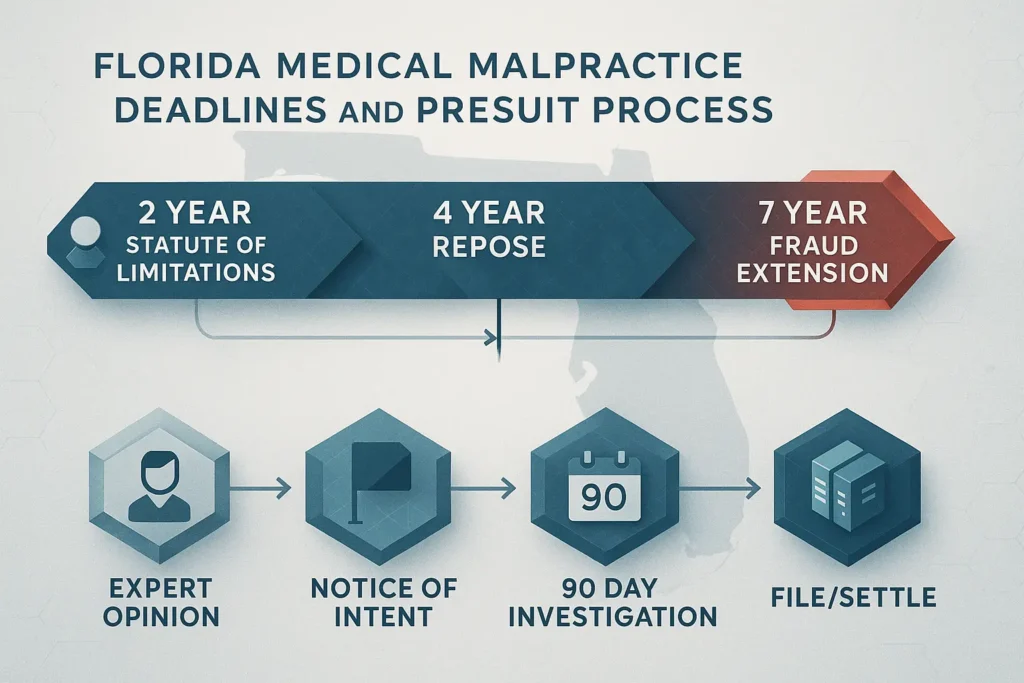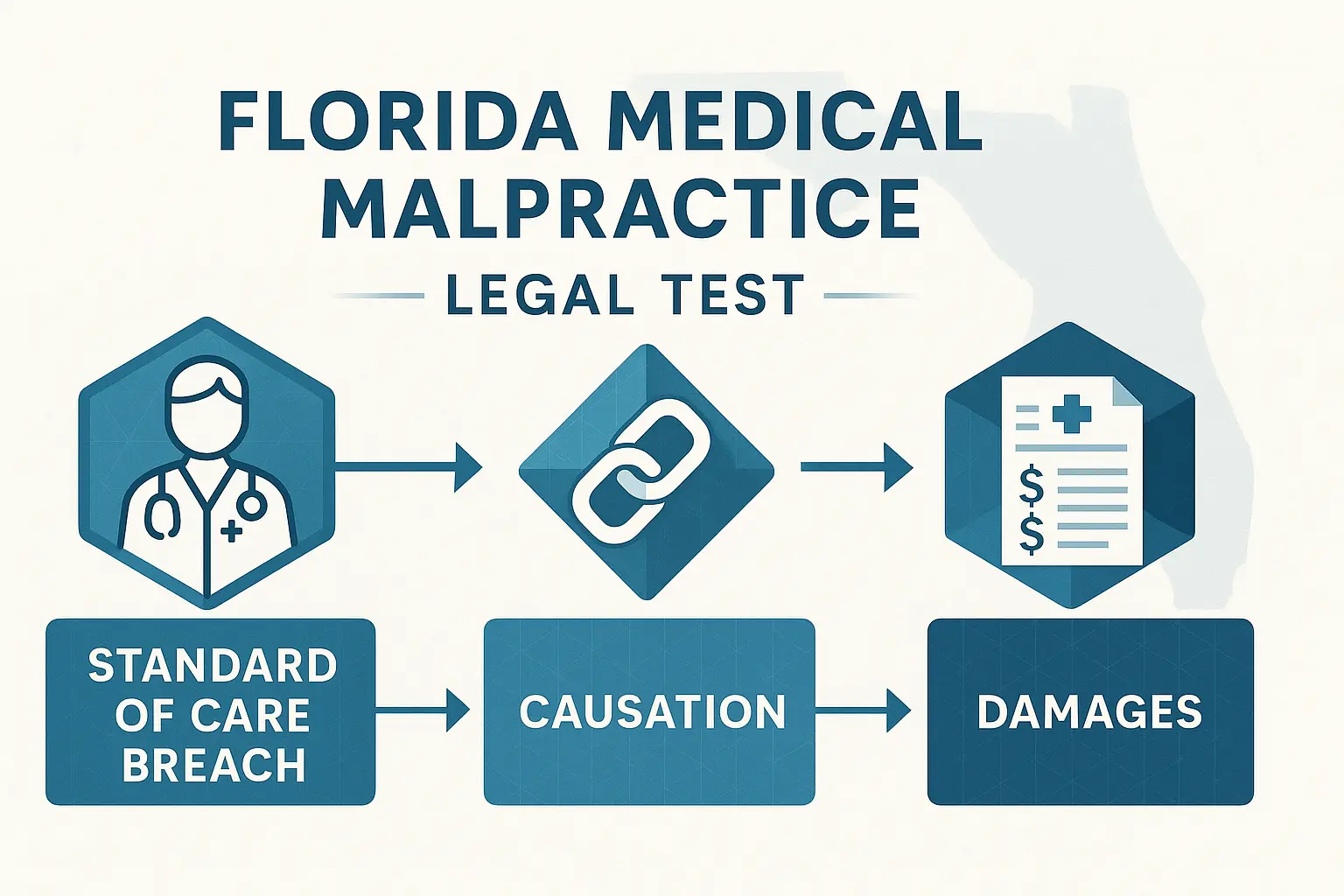Who this is for & what you’ll learn (brief, narrative): If you’re trying to decide whether a poor medical outcome in Florida is “just medicine” or legal malpractice, this guide walks you through the legal test, real world examples, the presuit investigation every Florida case must follow, who qualifies as an expert witness, how deadlines work, and what recent 2025 developments do, and don’t, change.
Table of Contents
What legally counts as medical malpractice in Florida?
In plain terms, Florida medical malpractice is professional negligence by a health care provider that falls below the accepted standard of care and causes injury. Lawyers prove four elements: a duty owed by the provider, a breach of the professional standard of care, a causal link (“proximate cause”), and actual damages. That four part framework is the lens Florida courts and insurers use in evaluating claims. (This is the classic tort structure under Florida law.)
Why it matters: a disappointing result is not enough. The question is whether care fell below what reasonably careful providers would have done under similar circumstances and that lapse caused measurable harm.

Practical, Florida specific examples
Think about malpractice as a mismatch between what should have happened and what did happen, with harm that follows.
Misdiagnosis or delayed diagnosis. A patient with classic stroke signs arrives within the treatment window but is not triaged or imaged in time, missing thrombolysis and emerging with avoidable deficits. In contrast, a rare disease missed despite reasonable testing often won’t qualify because the standard of care was met even if the outcome is tragic.
Surgical errors. Wrong site or wrong level spine surgery, retained sponges or instruments documented in the operative report, or a bile duct transection during routine cholecystectomy where the surgical plan and intraoperative cholangiography steps weren’t followed. Post op complications can be non negligent; the issue is whether the technique and monitoring met the standard.
Anesthesia events. Unrecognized difficult airway without a backup plan, inadequate intraoperative monitoring, or medication dosing errors that cause hypoxic brain injury.
Medication mistakes. Contraindicated drug combinations, chemotherapy dosing errors, or failure to reconcile medications on admission leading to hemorrhage or renal failure.
Birth injuries. Untreated fetal distress on the monitor, delayed decision to incision for emergency C section, or improper use of forceps/vacuum resulting in hypoxic ischemic injury or brachial plexus palsy. Not every cerebral palsy case is negligence; the question is whether monitoring and responses aligned with obstetric standards.
These scenarios are where Florida juries most often find a breach and causation when the records and expert testimony support them.
“Does it count?” quick view
| Likely to qualify (if causation proved) | Usually not malpractice |
|---|---|
| Missed classic heart attack or stroke presentation with harmful delay | Known, disclosed risks that occur despite proper care |
| Wrong site surgery, retained instrument, wrong patient/procedure | A rare complication where standards were followed |
| Medication or anesthesia dosing errors with resulting injury | A bad outcome without a provable standard of care breach |
| Ignored fetal distress → avoidable brain injury | A differential diagnosis miss that was reasonable at the time |
Florida law essentials (2025)
No caps on non economic damages in med mal verdicts. Florida’s damage caps were struck down by the Florida Supreme Court, first in wrongful death (Estate of McCall v. United States, 2014) and later in personal injury cases (North Broward Hospital District v. Kalitan, 2017). Caps remain unconstitutional in medical malpractice cases.
Comparative negligence, medical cases are different. Florida adopted a 51% bar rule in 2023, but the Legislature expressly excluded medical negligence from that change. Medical malpractice claims remain under the prior comparative fault approach rather than the 51% bar in §768.81(6).
“Free Kill” law, 2025 update. Florida’s wrongful death statute still prevents adult children over 25 and the parents of adult, non married children from recovering non economic damages when a loved one dies due to medical negligence. In 2025, a widely watched repeal bill passed the Legislature but was vetoed by the Governor, so the restriction remains in force today.
Statute of limitations & repose. Most Florida medical malpractice claims must start within two years of when the incident was discovered or should have been discovered, with a four year outer limit (statute of repose). Fraudulent concealment can extend it, and special rules apply to minors. Always verify exact deadlines against §95.11(4)(b) because facts change how the clock runs.
Expert witness requirements. To corroborate negligence before filing suit, Florida requires an expert in the same or a similar specialty who actively practices or teaches in that area and meets statutory criteria under §766.102(5). This gatekeeping rule is strict and often decisive in presuit.
Presuit investigation is mandatory. Before filing, claimants must send a Notice of Intent, provide a verified expert affidavit, and allow a 90 day presuit investigation window. During that period, each side may exchange records and take informal statements; at the end, a defendant must admit liability, deny, or propose arbitration. The statutes tightly regulate these steps.
How to act if you suspect malpractice
Begin by requesting complete medical records from all providers and facilities; Florida’s med mal presuit statutes anticipate robust record exchange, and delays in obtaining them can compress your timetable under §95.11(4)(b). Keep a contemporaneous timeline of symptoms, orders, and communications; that timeline becomes the backbone for your expert reviewer under §766.102(5). When you consult counsel, ask how they screen cases, which specialties they retain for review, and what the plan is for preserving device data, imaging, and pathology slides. If you’re not ready for a civil claim or want accountability without litigation, you can file a complaint with the Florida Department of Health for possible Board review of the practitioner’s conduct; this is independent of a lawsuit.
Florida presuit & deadlines
| Step | What it means in practice |
|---|---|
| Notice of Intent | Your lawyer serves each prospective defendant with a detailed notice and expert corroboration, then the 90 day presuit period begins. |
| 90 day investigation | Informal discovery: provider interviews, record exchanges, and liability review; the limitations period is tolled while this runs. |
| End of presuit | Provider must admit, deny, or offer arbitration; you may file suit once presuit ends or earlier by mutual agreement. |
| Global time limits | Two year discovery rule; four year repose (longer for fraud; special minor rules). Don’t assume tolling saves a late claim. |
Where we file and why locality matters
Most South Florida med mal suits are filed in the 11th Judicial Circuit (Miami Dade), 17th (Broward), and 15th (Palm Beach) depending on where the negligence occurred or defendants reside. Venue influences jury pools, timelines, and sometimes settlement posture; a firm experienced across these courts can calibrate strategy accordingly. (Local practice varies in scheduling, case management orders, and mediation protocols.)
Damages in Florida med mal cases
Florida juries can award economic losses (medical bills, future care, wage loss) and non economic losses (pain, suffering, disability, loss of enjoyment). Because caps are unconstitutional in med mal, damage modeling turns on your medical proof and life care planning rather than a statutory ceiling. Wrongful death claims remain constrained by §768.21(8) as noted above.
Alternative paths: Professional discipline vs. civil recovery
A Florida Department of Health complaint can result in investigation and discipline but does not compensate you; it’s about licensing and public safety. A civil malpractice action seeks compensation and accountability in court. Some families pursue both tracks, complaint first for transparency, lawsuit second once the facts and damages are clear.
Florida FAQs
- Is every bad outcome malpractice? No. Florida law keys on whether care fell below the professional standard and caused harm; some severe complications occur despite appropriate care.
- What if the hospital won’t give me my records? Your lawyer can enforce timely production and use presuit tools to obtain missing records before filing suit.
- Do damage caps limit what a jury can award? Not in Florida medical malpractice; the Supreme Court struck those caps. Wrongful death claims remain restricted by §768.21(8).
- Can I pursue discipline instead of a lawsuit? Yes. The Florida Department of Health accepts complaints that can trigger investigation and board action; it’s separate from a civil claim.
Written by Percy Martinez
By Percy Martinez, Esq., Florida Medical Malpractice Attorney (Reviewed for legal accuracy by Percy Martinez, Esq; last updated 08/13/2025.
This page provides general information about Florida medical malpractice and related health topics. It is not medical advice and not legal advice. Reading this page or contacting us through a form or chat does not create an attorney client relationship. We only become your lawyers after both sides sign a written engagement agreement. If you face a medical emergency, call 911 or seek immediate care. These statements align with standard medical information disclaimers used by trusted health publishers.




